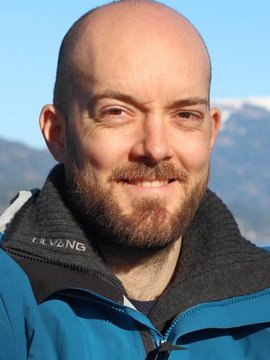Dr. Christoph Keuschnig

Function and Responsibilities:
MSCA Postdoc fellow - MICOL-FUNTRANS. In this project I aim to study the role of fungi in the initial colonization of barren soils in Arctic and Alpine environments. We follow the hypothesis, that fungal hyphae act as key routes for bacteria to explore new habitats in soil. Field experiments in Greenland, Iceland and the Alps are combined with laboratory microcosm experiments at the GFZ exploiting metagenomics and geochemical analysis in combination with 2D and 3D imaging methods.
Affiliated Postdoc researcher for metagenomics and bioinformatics in the ERC Synergy Grant DEEP PURPLE. I use metagenomic and metatranscriptomic approaches to study snow and ice biomes of the Greenland Ice Sheet focusing on their functional potential over the course of ice algae blooms. Specifically, I am researching the potential of fungal and bacterial communities in rock bio-weathering processes on glacier ice surfaces.
Research Interests:
My overarching research interests revolve around the ecology of microbial communities the cryosphere and their geochemical environment. In this field I specialized in soil, ice and snow habitats during the course of my research career. Recently, interkingdom interactions became key topic in my research where I am interested strategies of microbes to mutually exploit ecological niches.
I use metagenomic and -transcriptomic approaches in laboratory and field experiments and combine them with a diverse range of analytical techniques (quantitative PCR, wet chemistry, gas chromatography and soil structure analysis) to answer the who, where, how and how fast questions in microbial ecology. I have a particular interest in using state-of-the-art sequencing technologies and bioinformatical analysis to gain a mechanistic understanding of microbial community function at a genome resolved level and combine that knowledge with information gained in spatial analysis techniques at the micro-scale such as analytical microscopic methods.
Career:
since 15/06/2024 MSCA Postdoc Fellow at the German Research Center for Geosciences GFZ Potsdam
15/06/2022 – 14/06/2024 Postdoctoral Research Associate in Bioinformatics at the German Research Center for Geosciences GFZ Potsdam
01/10/2018 – 31/10/2021 Postdoctoral Research Associate in Environmental Microbiology & Genomics at the Centrale Innovation / Ecole Centrale de Lyon
01/10/2017 – 31/09/2018 Postdoctoral Research Associate in Environmental Microbiology & Genomics at the Ecole Centrale de Lyon in collaboration with the University of Gothenburg.
Education:
01/10/2013 – 06/12/2016 PhD in Microbial Ecology
Ecole Centrale de Lyon / University of Lyon
Title of thesis: Bacterial and fungal involvement in nitrogen cycling and N2O production in soil
Supervisors: Dr. Pascal Simonet & Dr. Catherine Larose
29/04/2009 – 06/07/2015 MSc Applied plant Sciences
University of Natural Resources and Life Sciences Vienna (BOKU)
Title of thesis: PhyloTrap – Separate capture of bacterial and fungal small subunit ribosomal RNAs by magnetic beads
Supervisor: Prof. Joseph Strauss
29/04/2009 – 15/07/2013 MSc Biotechnology
University of Natural Resources and Life Sciences Vienna (BOKU)
Title of thesis: Nitrite production by controlled nitrification of liquid pig manure
Supervisor: Dr. Markus Gorfer
20/09/2004 – 24/04/2009 BSc Food and Biotechnology
University of Natural Resources and Life Sciences Vienna (BOKU)
Title of thesis: Optimization of microbial fuel cells
Supervisor: Dr. Peter Holubar
Projects:
MICOL-FUNTRANS
Microbes in soil drive ecosystem services defining life on the Earth. Translocation of these microbes is a key feature in the spatial exploration of soil. This directly impacts major ecological processes such as niche colonization, bio-weathering of minerals and the development of soil structure, but knowledge of how microbes migrate in soil is scarce. A potential universal mechanism is fungal hyphae mediated transport (FHMT) where bacteria use hyphae of fungi as a route to translocate in a directed manner. However, this has been solely observed in the laboratory, but not in soil where single-cell level studies are restricted by technical limits. MICOL-FUNTRANS overcomes these limitations by developing and exploiting a novel system combining microfluidics, metagenomics with microbiological and microscopical methods to i) observe microbial movement in soil-like systems and ii) identify single involved organisms. Findings in the laboratory will be upscaled to an ecological level in a dedicated field study using a glacier forefields in the Arctic and the Alps, which constitute unique natural laboratories to study initial soil development as ongoing climate change melts glaciers and frees vast areas of barren soil at present.
The results of this project will foster an integrated view on the soil biome and push research on bacterial-fungal interactions to the centre of attention in soil microbiology and related industries. Specifically, knowledge of migration rates of microbes in soil will impact models on nutrient distribution and efforts in bioremediation of contaminated soil. A better understanding of the initial stages of soil structure formation and mineral weathering at the micro-scale will impact efforts in soil quality and health preservation related actions, a topic of highest societal and economic interest as the degradation of soil is one of the most pressing environmental threads we are currently facing.
Research Boards and Committees:
ScientificScientific Officer for Geomicrobiomes & Functions – Biogeoscience Division – European Geoscience Union - EGU


